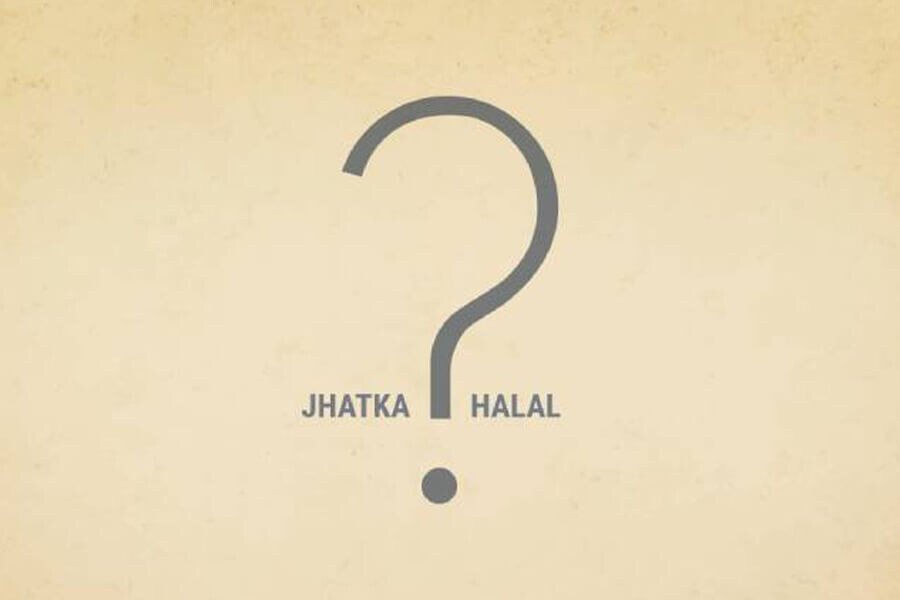Much has been said about the Halal means of slaughter and its impact on the food supply chain in particular, and the economy of the nation in general. Let us also look at the issue from a health perspective and try to deduce some tangibles.
Halal means anything that is allowed according to the Sharia law of Islamic jurisprudence. And thus Halal has spread to every aspect of the life of our nation like, soaps, cosmetics, drugs, books, groceries, and even hospitals and airports becoming Halal, though 80% people of this nation are Hindus.
Halal has become a code of sale and purchase to and from a particular community, thus laying the grounds for an economic apartheid, while also being a parallel certification system with no legal sanctity or accountability to the government of the day.
Coming back to health aspects of Halal, let’s divide it into two areas: the meat trade and the rest of it.
Halal meat is a very specific form of slaughter and packaging which consists of following —
- The animal must be facing the Kaabaa, the holy place of Muslims.
- The slaughter must be done by a Muslim only.
- Kalma must be recited during the slaughter.
- Most importantly, only the carotid artery and the trachea of the animal must be slit and the animal must bleed to death.
The media space has been flooded with literature that this form of slaughter is healthier since all blood is pumped out by the dying animal’s heart. It is also claimed that for the same reason Halal meat is tastier and has a longer shelf life. However, there is not a single scientific study to back these claims.
Let us attempt to look at this from a purely medical perspective. Let us also compare the ‘Dharmic’ (I use the word “dharmic” to include Sikhs and Hindus) way of slaughter, known as Jhatka, with Halal to gain better understanding of the issue.
Jhatka comprises of beheading the animal in a single stroke. This is in tune with the Hindu and Sikh scriptures and the commands of our gurus, especially Sri Guru Gobind Singh.
There is another form of slaughter advocated by animal rights activists where the animal is stunned mechanically or electrically and then beheaded by a single stroke . It is called Single Slice Humane Slaughter (SSHS) and is widely used in the Western world.
There are three medical aspects of slaughtering technique we will consider to compare Halal with Jhatka.
First, the claim that Halal leads to cleansing of blood from the body makes little sense because though blood is known to be a good culture medium of bacteria, there is no evidence that fresh blood is harmful to the body. What we eat as meat has blood enmeshed in it anyway. Besides, blood has a tendency to clot when exposed to air, so clotting around the carotids would anyway block them, hampering the exit of blood.
This looks like a lame argument to support Halal unless it can be supported with incontrovertible scientific data.
Secondly, when the animal is cut open but is still alive to feel the pain because its spinal cord is intact, the animal’s body releases stress hormones, adrenaline and noradrenaline, both of which are known to be bad for the human heart. This does not happen with Jhatka slaughter because of the rapidity of death that ensues decapitation.
Thirdly, Halal is an extremely cruel form of slaughter where the animal’s throat is slit and it is left to bleed to death. This cruelty triggers a complex chain of emotional and biochemical reactions in the animal’s body some of which are known to us and some unknown.
Shifting away from the issue of meat, what are the other implications of Halal food in our day to day life?
Halal proponents say that alcohol or anything derived from pigs is haram, or prohibited.
A huge number of drugs like cough syrups need alcohol as a base and concentrated spirit is the best skin disinfectant known. Are we to understand that due to the beliefs of a particular community, time tested drug compositions and compounds that shield us from bacteria and viruses are to be re-researched and re-introduced into our health services? And then what is the certainty of finding alternatives to alcohol, besides the billions of dollars and man hours which will be lost in such an endeavour?
The usage of products derived from pigs is prohibited according to the non-negotiable caveats of Halal.
Consider this against the background that the pig is genetically the closest animal to humans and holds the key to revolutionize treatments to various human ailments like diabetes, parkinsonism, burns and contractures among other things.
Until just a few years ago the pig pancreas was the only source of insulin capable of being produced at an industrial scale and it helped save millions of lives. Pig skin is also used as an alternative to human skin in surgery of burns and contractures.
Can we even conceive the loss of human lives and ensuing morbidity that can stem from abandoning research on an area with a massive potential such as pig derivatives?
American pharma companies were forced to remove pork gelatine as a covering for capsules and was replaced by beef gelatine, costing billions of dollars for a belief that does not seem to have any solid scientific backing.
The economic demerit, and perhaps the most dangerous aspect of Halal, lies in how it works towards assuming full control over the global supply chain. Needless to say, this practice is religiously discriminatory towards all non- Muslims of the world and pushes millions out of jobs.
This is also in complete violation of the Lassies-Faire economic model of the modern world and against creating a competitive market.
Case in example, the entire meat supply of five star hotels and airlines in India is controlled by Halal certified vendors only. This kind of monopolization of food supply chain seriously affects the freedom of choice that should be the hallmark of any free and democratic society. Moreover, Halal certifications have no legal or scientific basis but they have completely overtaken our food supply chain.
Most of the times, big corporates yield to this economic blackmail by Sharia proponents but a lot of times Halal certifications are enforced through fear of violence as well.
Thus Halal certifications are an extortion of businesses and add huge costs to food. An estimate shows that global Halal certification economy runs into a trillion US dollars.
When companies like Amul, Patanjali, Cadbury, Bikaji, KFC, McDonald’s, Air India, Indian Railways yield to this unfair practice, we must understand the seriousness of this economic besiegement of our nation and national economy.
It is time that we get the right facts around Halal economy so that we can make a reasoned choice based on science and not superstition.
To sum up:
- Based on sheer science, Halal meat is not superior to Jhatka meat. In fact, Jhatka is safer.
- Jhatka is the closest to humane slaughter.
- Jhatka is religiously sanctioned for Dharmics (Hindus, Sikhs etc.).
- Halal food is about capturing the food supply chain.
- Halal is religious discrimination and works against the free market.
- Halal has the potential to seriously jeopardize medical research.
- Halal is a parallel food certification and food supply system without legal basis or checks and balances.
It is time that a fair playing field is offered to all players of global food supply chain and nations and companies do not yield to compulsions of sectarian belief systems.
— The author of this article wishes to remain anonymous. The author, however, wishes it to be known that s/he is a medical professional and has researched the subject carefully before writing this article. S/he is also willing to answer questions that readers may wish to raise about the content of this article. (Ed)











